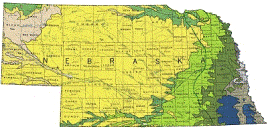United States Geological Survey

United States Geological Survey: Staff Publications
Document Type
Article
Date of this Version
6-2001
Abstract
We used aerial thermography to determine the location of sandhill crane (Grus canadensis) roosting sites during a single night over a 142-km reach of the Platte River, Nebraska. We assessed the influences of human disturbance features, screening of disturbance features by woody vegetation, distance to surrounding cropland of various types and channel width on distribution patterns of sandhill crane roosting sites with the aid of a geographic information system (GIS). We found that roosting sites were farther from bridges and paved roads than random points along the river channel; a visual woody screen mitigated the effect of bridges on locations of roosting sites; and roosting sites were in wider river channels than were observed at random points.


Comments
Published in Published in THE PRAIRIE NATURALIST 33:2 (June 2001), pp. 93-99.